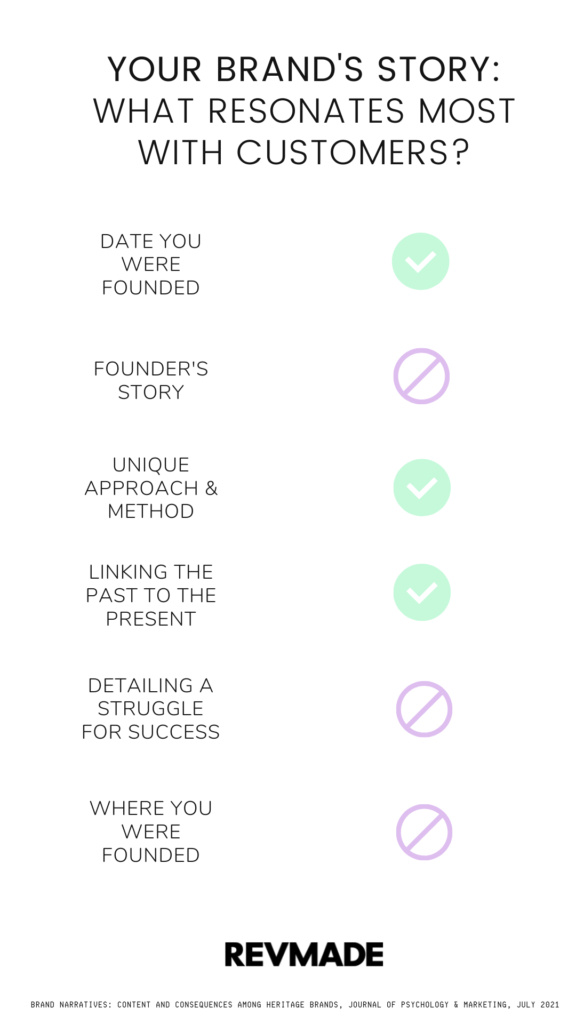Brands love telling their story. Are audiences listening? One study aims to find out.
How to tell your brand's story in a way that resonates with your audience, according to researchRevmade regularly scours the internet for new studies that offer important insights for marketers. Then we write them up for you in as few words as possible. (Want to get them emailed to you? Sign up here.)
Lots of brands like to tell their story (to mixed reviews among audiences). But what elements of a brand narrative actually resonate with consumers? That’s the question guiding recent research published in the academic journal Psychology and Marketing called “Brand narratives: Content and consequences among heritage brands.”
What’s the key question the study wants to answer?
- In their words: “What narrative content will enhance consumer’s perceptions of brand heritage?”
- In other words: What parts of a brand’s story should marketers build on to boost relevance and reputation in their space?
- And in a thousand words: How can we get here?

What does this mean for you?
If you’re building a brand strategically on a storied history (or aspiring to be), this study matters to you. Heritage marketers “carefully select information from bygone times… and curate it to generate a marketing advantage.” (Think: Lindt Chocolate, Levis, Ford, etc. but know that the lessons apply to any brand looking to build reputation and relevance in their space.)
The researchers were most interested in what brand storytelling elements were most likely to enrich consumer perceptions of brand heritage. Why? Because, as the researchers put it: “Brand heritage, the cumulative history and performance of a brand over time, is a fundamental component of brand equity.” In other words – it adds business value.
What did the study specifically do?
This study aimed to unpack what elements of a brand’s story actually resonates with consumers, noting a disconnect between what brand marketers tend to focus on and what really matters to consumers. Along the way, researchers:
- Interviewed brand managers to understand their approach to heritage marketing
- Looked at 55 brand websites and analyzed their content
- Tested what mattered most/least to consumers
What’s the conclusion of the study, in a nutshell?
Brand managers assume a lot about what makes their brand special, but some elements outweigh others in terms of their impact, like:
- Omni-temporality: How a brand links its past to the present resonated highly with consumers in the study. (For fans of Mad Men, think of the Heinz beans campaign — “Some things never change”)
- Technology: A brand’s unique approach and method – or the technology they employ – returned a strong potential for differentiation. Focus on explaining the methods and unique approach — and how they tie to core values and identity.
- Foundation date: Foundation date effectively conveys longevity and track record. (It’s commonly used though, so may not be a big differentiator, depending on your space.)
Perhaps surprisingly …
Other traditional elements, like where a company was founded, the struggles the company has overcome, or even the founder’s story itself didn’t resonate as deeply.
- Company founder: The study did not find unanimous evidence that a founding personality influences consumers.
- The struggle is too real: Good stories show struggle, then success. But this “delicate” factor (marketers agree it’s risky to leverage) didn’t make an impact for consumers in this study.
- Location, location, location: It’s maybe the most common heritage tie (Paris anyone?) but its effects aren’t reliable.
TL;DR:

Marketers looking to build messaging around their brand’s heritage should think about their brand’s history in the context of bigger cultural themes — as well as what makes their approach and contributions to the community unique. Ask yourself:
- How do we establish our brand’s founding as a milestone in the space we serve?
- How do we uniquely solve problems or add value to the community we serve?
- How can we link our history to the history of the community we’re a part of?
Great marketing makes organizations more relevant to the communities they serve. And thinking of how your brand’s story intersects with what your target audience is interested in is a big step toward earning greater relevance.R
Like this post? Check out more TL;DR research summaries here:
- New research underscores the need to map your content strategy to changing audience trends
- Research hints that the future of marketing will be built around trust and transparency
Want a better understanding of how your brand can be more relevant to your audience? Let’s have a conversation!
Subscribe
Get our weekly newsletter for tips on how to drive better content marketing performance.
For a regular stream of ideas, research and links we find helpful. And of course, to say hi!
